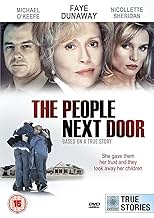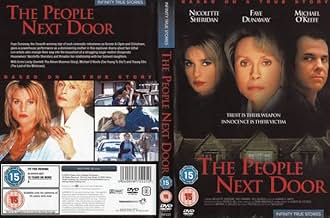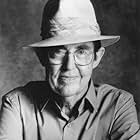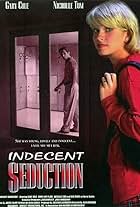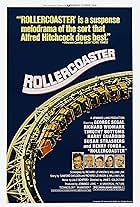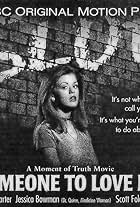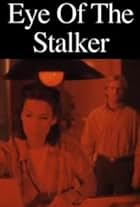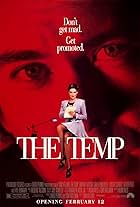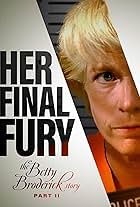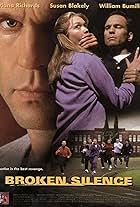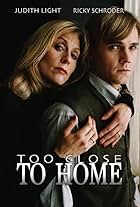A young and busy mother places her trust in the friendly next-door neighbors, unaware that there's something sinister at work behind their deceiving kindness.A young and busy mother places her trust in the friendly next-door neighbors, unaware that there's something sinister at work behind their deceiving kindness.A young and busy mother places her trust in the friendly next-door neighbors, unaware that there's something sinister at work behind their deceiving kindness.
Photos
David Denny
- Brady
- (as David Denney)
- Director
- Writer
- All cast & crew
- Production, box office & more at IMDbPro
Storyline
Did you know
- TriviaThe People Next Door (1996) had 16.6 million viewers on its original air date.
- Quotes
Lt. Jack Driscoll: [He visits Anna's house after she reports her kids missing] If you ask me, it looks like you've been rode hard and put up wet.
Featured review
I am not familiar with the facts of the case upon which "Escape from Harm" is supposedly based, but given the normal track record of both Hollywood and the American television industry in dealing with allegedly true stories it is a fair assumption that they bore little resemblance to the story told here. The central character is Anna Morse, the mother of three young daughters, who has recently left her violent husband and moved into a new house. At first it seems that her new next door neighbours Garret and Donna James are friendly and caring, but it quickly becomes clear that they are nothing of the sort. In fact, they are a couple of psychopaths who kidnap Anna's two youngest daughters and then disappear. The rest of the film deals with Anna's increasingly desperate attempts to find her missing children.
The film overall suffers from a common fault with TV movies, emotional over-simplification. The story is presented from Anna's viewpoint as a simple tale of "plucky mom searches for missing kids" and ignores the complexities of the situation, even potentially interesting ones. I wanted to know just why Anna and her mother Ellen appear not only to be estranged from one another but to come from quite different social backgrounds. Anna, as played by Nicolette Sheridan, seems to be from a typical blue-collar working-class background whereas Faye Dunaway's Ellen appears bourgeois and genteel. If the cause of their estrangement was a rebellion on Anna's part against her mother's middle-class values, his is never made clear.
I would also have been more interested in the film had it tried to explain just why the Jameses (especially Garret, by far the stronger character) acted as they did, but unfortunately it simply takes the view that they are evil nut jobs, and as evil nut jobs are simply a malign force of nature they don't have motivations which can be rationally explained.
I watched this movie when it was recently shown on British television, largely because of the presence of Faye Dunaway, but in many ways it illustrates how her career has gone downhill since her heyday. I am unsure whether the cause of this decline is the oft-made assertion that Hollywood does not provide enough leading roles for older women (although this doesn't seem to have held back her contemporary Meryl Streep) or whether Dunaway is correct in her belief that her career as a leading lady was permanently damaged by the failure of "Mommy Dearest" in 1981, but it seems indisputable that since the eighties she has been unable to command roles of the quality that she could in the late sixties and seventies. Watching this dull, pedestrian TV movie it was difficult to believe that she was once the star of major films as good as "Bonnie and Clyde", "Chinatown" and "Network". 4/10
The film overall suffers from a common fault with TV movies, emotional over-simplification. The story is presented from Anna's viewpoint as a simple tale of "plucky mom searches for missing kids" and ignores the complexities of the situation, even potentially interesting ones. I wanted to know just why Anna and her mother Ellen appear not only to be estranged from one another but to come from quite different social backgrounds. Anna, as played by Nicolette Sheridan, seems to be from a typical blue-collar working-class background whereas Faye Dunaway's Ellen appears bourgeois and genteel. If the cause of their estrangement was a rebellion on Anna's part against her mother's middle-class values, his is never made clear.
I would also have been more interested in the film had it tried to explain just why the Jameses (especially Garret, by far the stronger character) acted as they did, but unfortunately it simply takes the view that they are evil nut jobs, and as evil nut jobs are simply a malign force of nature they don't have motivations which can be rationally explained.
I watched this movie when it was recently shown on British television, largely because of the presence of Faye Dunaway, but in many ways it illustrates how her career has gone downhill since her heyday. I am unsure whether the cause of this decline is the oft-made assertion that Hollywood does not provide enough leading roles for older women (although this doesn't seem to have held back her contemporary Meryl Streep) or whether Dunaway is correct in her belief that her career as a leading lady was permanently damaged by the failure of "Mommy Dearest" in 1981, but it seems indisputable that since the eighties she has been unable to command roles of the quality that she could in the late sixties and seventies. Watching this dull, pedestrian TV movie it was difficult to believe that she was once the star of major films as good as "Bonnie and Clyde", "Chinatown" and "Network". 4/10
- JamesHitchcock
- Dec 30, 2010
- Permalink
Details
Contribute to this page
Suggest an edit or add missing content


